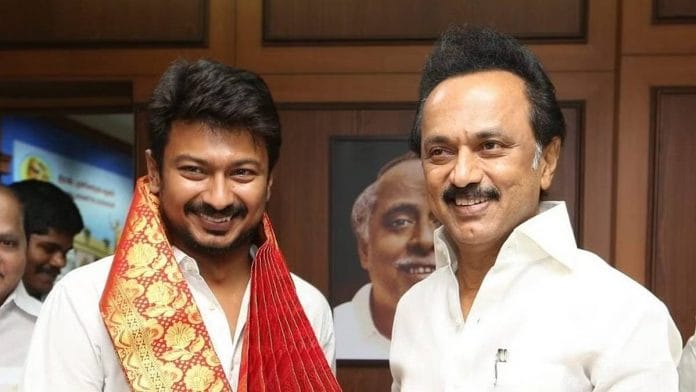The succession issue in the Dravida Munnetra Kazhagam seems to have been settled with the appointment of Tamil Nadu Chief Minister MK Stalin’s son, Udhayanidhi Stalin, as the state’s deputy chief minister. The DMK’s rising sun symbol is being interpreted as ‘rising son’ following Udhayanidhi’s promotion from tenth in seniority to the third position in the cabinet of ministers. While this is being touted as an internal party affair that shouldn’t be overanalysed, it reveals that the mantle of chief ministership, which was passed on from M Karunanidhi to his son Stalin, is again being prepared for the family’s next generation.
According to The Indian Express, Udhayanidhi had himself sought this promotion, arguing that a deputy CM post would allow him to ease some of his father’s administrative burden, and pave the way for “larger acceptance” within the government. Udhayanidhi’s contribution to DMK’s growth is negligible when compared to the veterans in the cabinet and the party. But family lineage is stronger than performance, merit or seniority.
Incidentally, his claim to fame in the national media can be attributed to his insensitive, highly objectionable, and controversial remarks on the need to eradicate “Dengue and malaria-like Sanatana Dharma”. According to him, Sanatana Dharma perpetuates the caste system and opposes the idea of social justice. Besides Hindu groups, his comments were found to be objectionable by the Supreme Court, which rebuked him for abusing his free speech rights. “You are not a layman. You are a minister. You should know the consequences,” the bench had told him. Like the Congress, which uses poverty and caste as launch pads for its hereditary leadership, the DMK uses the templates of social justice and anti-Hindutva rants to introduce next-generation family members as leaders.
The new deputy chief minister has to use all the time-tested tools to keep his flock together in the party. With his father in power and no strong and viable political Opposition in Tamil Nadu, Udhayanidhi can consider himself lucky to have inherited his authority as a ‘birthright’.
Tamil Nadu elections will be held in April-May 2026, just about a year and a half later. The DMK faces no threat in the assembly, but it could face two obstacles in the coming months, especially closer to the elections. One is from the estranged party and family members who would most likely challenge ‘leadership by inheritance’. And the other is from political opponents who will re-group and present a stronger coalition.
Challenge from family, DMK seniors
DMK patriarch Karunanidhi did a balancing act in the family by promoting three out of six children: Stalin, MK Alagiri and Kanimozhi. Stalin will be considered first among equals as long as he occupies the top position in the government. Closer to elections, the other members of the family could stake their claim to the seat of power. As of now, there is no senior family member who could be a fair jury in the event of a feud spilling out in the public.
A similar tussle was witnessed in Maharashtra when Shiv Sena supremo Bal Thackery handed the party’s mantle to his ‘not so politically suave’ son Uddhav over his politically active and worthy nephew Raj Thackery. The one-family party split, and was further fragmented when Uddhav’s authority was challenged by seniors who had shouldered greater responsibilities and had helped build the Shiv Sena brick by brick. The Samajwadi Party (SP) in Uttar Pradesh, the Yuvajana Sramika Rythu Congress Party (YSRCP) and the Nationalist Congress Party (NCP) have all faced splits due to internecine squabble. And the DMK should gear up for something similar.
Also read:
Watch out for BJP, AIADMK
A weak and immature leadership and vacuum at the top, coupled with an anti-incumbency factor, might accrue some advantage to the DMK’s arch-rival All India Anna Dravida Munnetra Kazhagam (AIADMK), which still can boast of a strong support base and local caste-based leaders. The Bharatiya Janata Party has managed to find a foothold in Tamil Nadu and might form a coalition of sorts to consolidate its voter base. A post-poll alliance between the BJP and the AIADMK cannot be ruled out if the numbers are in their favour. Eventually, one-family parties may find it difficult to remain relevant in a democratic and discerning polity.
In the Indian political setup, the BJP and the communist parties are probably the only ones who have been able to circumvent the hereditary leadership tag and stick to an ideology-based political narrative. Perpetuating dynasties is feudalistic. The Election Commission should study cases like the DMK’s and suggest course correction to democratise political parties.
Seshadri Chari is the former editor of ‘Organiser’. He tweets @seshadrichari. Views are personal.
(Edited by Zoya Bhatti)






